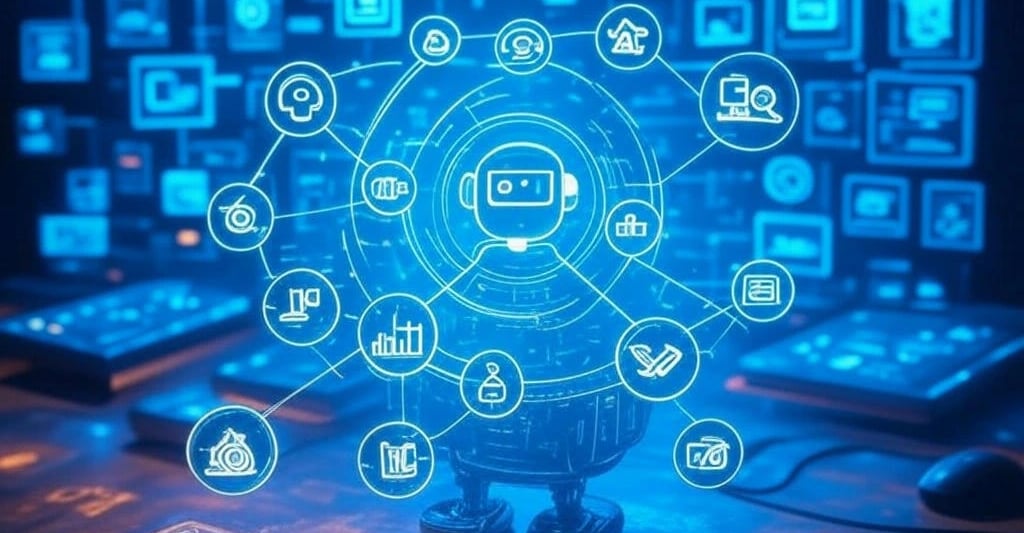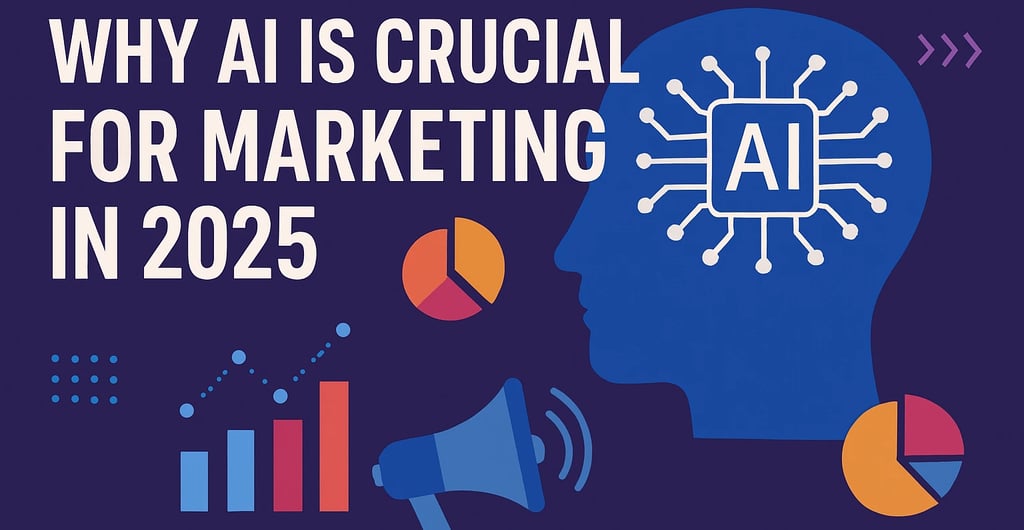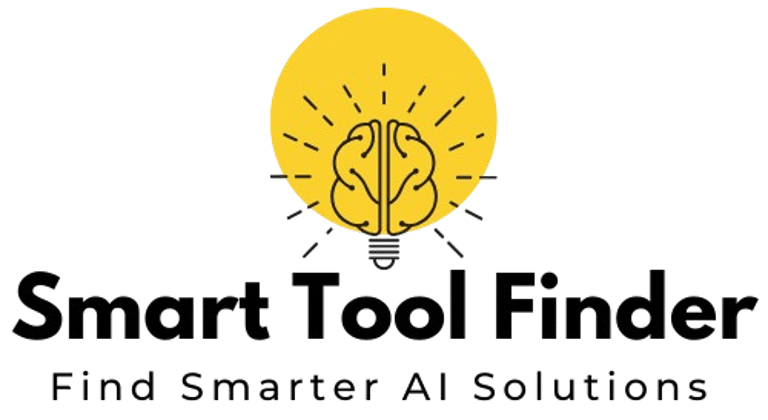The Best AI Tools for Digital Marketing in 2025: Your Ultimate Guide
Discover the best AI tools for digital marketing in 2025! Explore AI content creation, SEO, chatbots, email, social media, ads, analytics, and more. Boost your strategy now!


Welcome to the future of digital marketing! As we step into 2025, artificial intelligence (AI) is no longer a buzzword—it’s the backbone of successful marketing strategies.
From automating repetitive tasks to delivering hyper-personalized customer experiences, AI is transforming how brands connect with audiences.
If you’re a digital marketer, business owner, or content creator looking to stay ahead, understanding and leveraging the best AI tools for digital marketing in 2025 is non-negotiable.
In this comprehensive guide, we’ll dive deep into the top AI tools shaping the industry, their practical applications, and how they can elevate your marketing game.
Let’s explore why AI is crucial and uncover the tools you need to thrive this year!
Why AI is Crucial for Marketing in 2025


AI’s role in marketing has evolved rapidly, and 2025 marks a tipping point. According to industry insights from gartner.com, personalization driven by AI will account for over 80% of consumer interactions, making it a must-have for staying competitive.
Automation is saving marketers countless hours, while predictive analytics is unlocking deeper customer insights.
Trends like real-time data processing, voice search optimization, and AI-powered creativity are setting the stage for a marketing revolution.
In our experience, businesses that adopt AI early see a significant boost in ROI—up to 30% higher campaign efficiency, as noted in recent studies from forrester.com.
Whether you’re a small business owner or an enterprise marketer, AI tools can streamline workflows, enhance customer engagement, and optimize ad spend.
But with so many options, how do you choose?
This guide breaks it down, focusing on the best AI tools for digital marketing in 2025 across key categories.
Categorization of AI Tools for Digital Marketing
To make sense of the AI landscape, we’ve categorized the best AI tools for digital marketing in 2025 into six essential areas.
Each category addresses specific marketing challenges, from content creation to analytics, ensuring you have a tool for every need.
1. Content Creation & SEO
AI content creation tools and AI for SEO are revolutionizing how marketers produce and optimize content. These tools help generate blog posts, meta descriptions, and keyword strategies, saving time while boosting search rankings.
What It Is and Does: AI-powered platforms use natural language processing (NLP) to craft high-quality content and suggest SEO improvements. In 2025, expect enhanced capabilities like real-time keyword trend analysis and multilingual content generation.
Key Features: Automated content drafting, SEO audits, competitor analysis, and readability scoring.
Problems It Solves: Overcomes writer’s block, ensures keyword consistency, and reduces manual optimization efforts.
Marketing Goals: Improves organic traffic, enhances user engagement, and supports long-term SEO growth.
Benefits: Speeds up content production by up to 50% and aligns with Google’s evolving algorithms. A key challenge is ensuring the content remains original—rely on human oversight to refine AI outputs.
Drawbacks: Some tools may produce generic content if not customized, and advanced features often require paid plans.
Best Suited For: Content marketers, SEO specialists, and small businesses scaling their online presence.
Example Tools: Platforms like Jasper.ai and SurferSEO are poised to lead, offering AI content creation tools with predictive SEO insights.
2. Customer Service & Chatbots
AI chatbots for customer service are transforming customer interactions, providing 24/7 support and personalized responses.
What It Is and Does: These tools use AI to handle inquiries, qualify leads, and guide users through sales funnels, with 2025 seeing smarter conversational AI capable of handling complex queries.
Key Features: Multilingual support, sentiment analysis, and integration with CRM systems.
Problems It Solves: Reduces response times, lowers support costs, and improves customer satisfaction.
Marketing Goals: Enhance lead nurturing, increase conversion rates, and build brand trust.
Benefits: Cuts support costs by up to 30% while offering scalable solutions. What we’ve found is that training chatbots with brand-specific data is crucial for accuracy.
Drawbacks: Initial setup can be time-intensive, and overly automated responses may frustrate users if not monitored.
Best Suited For: E-commerce brands, service-based businesses, and enterprises with high inquiry volumes.
Example Tools: Tools like Drift and Tidio are expected to evolve, offering advanced personalization with AI chatbots for customer service.
3. Email Marketing & Automation
AI email marketing tools are redefining campaign success by optimizing send times and content.
What It Is and Does: These platforms use AI to analyze subscriber behavior, personalize emails, and automate sequences, with 2025 bringing predictive analytics for open rates as highlighted on blog.hubspot.com.
Key Features: Dynamic content insertion, A/B testing, and deliverability optimization.
Problems It Solves: Low engagement rates, generic messaging, and manual scheduling.
Marketing Goals: Boosts open and click-through rates, drives conversions, and improves ROI.
Benefits: Can increase email ROI to $42 per $1 spent, per industry data. A key challenge is integrating with existing email platforms—ensure compatibility.
Drawbacks: Advanced features may require higher-tier plans, and data privacy compliance (e.g., GDPR) adds complexity.
Best Suited For: Digital marketers, e-commerce teams, and B2B companies.
Example Tools: Seventh Sense and HubSpot’s AI email tools are set to dominate with enhanced automation.
4. Social Media Management
AI social media management tools streamline posting, analytics, and engagement.
What It Is and Does: These tools schedule posts, analyze performance, and suggest content using AI, with 2025 trends focusing on video content optimization.
Key Features: Auto-scheduling, sentiment analysis, and hashtag recommendations.
Problems It Solves: Inconsistent posting, manual analytics, and audience targeting issues.
Marketing Goals: Increase engagement, grow followers, and enhance brand presence.
Benefits: Saves hours weekly and improves targeting accuracy. In our experience, real-time trend detection is a game-changer.
Drawbacks: Some tools lack deep platform-specific insights, requiring manual tweaks.
Best Suited For: Social media managers, influencers, and small businesses.
Example Tools: Hootsuite and Buffer are evolving with AI-driven insights for social media management.
5. Advertising & PPC
AI advertising platforms optimize pay-per-click (PPC) campaigns and ad creatives.
What It Is and Does: These tools use machine learning to bid smarter, target audiences, and design ads, with 2025 seeing AI-driven creative testing.
Key Features: Automated bidding, audience segmentation, and A/B testing.
Problems It Solves: High ad spend with low returns, poor targeting, and creative fatigue.
Marketing Goals: Maximizes ROI, reduces cost-per-click, and scales campaigns.
Benefits: Can cut ad waste by 20% with precise targeting. What we’ve found is that regular monitoring prevents overspending.
Drawbacks: Requires initial data input for optimal performance and may need expert oversight.
Best Suited For: PPC specialists, e-commerce brands, and large advertisers.
Example Tools: Google Ads with AI enhancements and Smartly.io are leading contenders.
6. Analytics & Predictive Modeling
Predictive analytics in marketing leverages AI to forecast trends and customer behavior.
What It Is and Does: These tools analyze data to predict outcomes, optimize campaigns, and identify opportunities, with 2025 advancing real-time insights.
Key Features: Trend forecasting, customer lifetime value prediction, and ROI tracking.
Problems It Solves: Data overload, inaccurate forecasting, and missed opportunities.
Marketing Goals: Improves decision-making, enhances targeting, and boosts efficiency.
Benefits: Increases campaign success rates by up to 25%. A key challenge is interpreting complex data—pair with expert analysis.
Drawbacks: High costs for advanced models and requires data integration.
Best Suited For: Marketing analysts, enterprise teams, and data-driven businesses.
Example Tools: Tableau with AI integrations and IBM Watson are poised for growth.
7. Video & Image Generation
AI video and image generation tools are creating stunning visuals for campaigns.
What It Is and Does: These platforms generate videos, edit images, and create graphics using AI, with 2025 focusing on hyper-realistic outputs.
Key Features: Automated video editing, background removal, and style customization.
Problems It Solves: High production costs, time-intensive editing, and lack of creativity.
Marketing Goals: Enhances visual storytelling, boosts engagement, and supports multi-channel campaigns.
Benefits: Reduces production time by 40% and offers cost-effective solutions. In our experience, quality varies with input data.
Drawbacks: May require manual refinement for professional polish.
Best Suited For: Content creators, brands with video strategies, and small businesses.
Example Tools: Runway ML and Canva’s AI features are expected to shine.
Best Free AI Tools for Digital Marketing
For marketers on a budget, the best free AI tools for digital marketing offer powerful features without the cost barrier. These tools are perfect for startups, freelancers, or small businesses testing AI waters in 2025.
What It Is and Does: Free AI tools provide basic functionalities like content generation, keyword research, and social media insights, with some offering limited access to premium features. In 2025, expect updates to enhance usability and integration.
Key Features: Basic content drafting, free SEO audits, limited chatbot responses, and social media scheduling.
Problems It Solves: Lack of resources for paid tools, limited time for manual tasks, and need for initial AI exposure.
Marketing Goals: Improves productivity, supports early-stage campaigns, and builds foundational skills in AI marketing automation.
Benefits: Accessible to all, reduces entry barriers, and provides a testing ground. What we’ve found is that free tiers often serve as a stepping stone to paid plans.
Drawbacks: Limited features, potential watermarks on content, and occasional downtime or support delays.
Best Suited For: Startups, solo entrepreneurs, and small businesses exploring AI content creation tools or AI for SEO.
Example Tools: ChatGPT (openai.com) offers free content generation, Ubersuggest provides free keyword research, and Canva’s free tier includes AI-assisted design tools. For more on free options, see our guide [placeholder for internal link].
How to Choose the Right AI Tools
Selecting the best AI tools for digital marketing in 2025 depends on your needs. Here’s how to decide:
Define Goals: Are you focusing on AI content creation tools, AI for SEO, or predictive analytics in marketing? Align tools with objectives.
Budget: Free tiers (e.g., ChatGPT) suit startups, while enterprises may need premium plans (e.g., HubSpot).
Integration: Ensure compatibility with your tech stack (e.g., CRM, email platforms).
Scalability: Choose tools that grow with your business, like those offering enterprise plans.
Ease of Use: Look for intuitive interfaces, especially for teams new to AI marketing automation.
Support: Prioritize vendors with robust customer service and tutorials.
Test tools with trials and start with one category (e.g., AI email marketing tools) before expanding.
The Future Outlook: Emerging AI Trends in Marketing Beyond 2025
Looking beyond 2025, the future of AI in marketing promises even more innovation. Expect advancements in voice search optimization, AI-driven virtual reality experiences, and ethical AI frameworks addressing privacy concerns.
The integration of generative AI with augmented reality (AR) could redefine advertising platforms, while sustainability-focused analytics will gain traction. Stay adaptable to harness these trends.
FAQs About the Best AI Tools for Digital Marketing in 2025
1. Can AI replace digital marketers?
No, AI can’t fully replace marketers. It enhances efficiency with AI marketing automation and content creation, but human creativity and strategy remain essential. In our experience, AI is a co-pilot, not a replacement.
2. How much do AI marketing tools cost?
Costs vary widely. Free tools like ChatGPT exist, while premium options (e.g., HubSpot, starting at $15/month) offer advanced features. Enterprise solutions like Seventh Sense can reach $450/month. Budget according to your needs.
3. How to integrate AI into my marketing strategy?
Start by identifying pain points (e.g., slow content production), select a tool (e.g., SurferSEO for AI for SEO), and integrate it with existing platforms. Train your team and monitor performance monthly.
4. Is AI good for small business marketing?
Yes! Tools like Canva’s AI features and Ubersuggest offer affordable solutions for small businesses, boosting AI content creation tools and AI for SEO without breaking the bank.
5. What are the risks of using AI marketing tools?
Risks include data privacy issues, over-reliance on automation, and initial learning curves. Mitigate these with transparent data policies and human oversight.
6. Which AI tool is best for social media in 2025?
Tools like Buffer with AI enhancements are top picks for AI social media management tools, offering scheduling and analytics tailored to 2025 trends.
7. How often should I update my AI tools?
Check for updates quarterly to keep up with AI advancements and ensure compatibility with your marketing goals.
Conclusion
The best AI tools for digital marketing are ready to shake up your strategy, whether it’s crafting content with AI or digging into predictive analytics.
By tapping into AI-powered automation, personalized marketing, and smart ad platforms, you can unlock some serious efficiency and ROI gains.
From our hands-on experience, the trick is to start small, experiment with a few tools, and then scale up smartly as you go.
The future of AI in marketing? It’s looking bright with tons of exciting possibilities ahead!
Let’s shape the future of digital marketing together!


About Author:
Hey there, I’m Isabella Kim, your friendly guide at Smart Tool Finder, where I’m passionate about turning the complex world of AI and digital tools into simple, actionable steps for beginners like you. I love making tricky topics—like AI courses, SEO tools, and automation—easy to get, and I’m here to support you every step of the way with practical tips and insights to kickstart your learning adventure!


